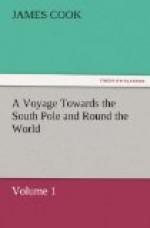It hath been already observed, that the number of war-canoes belonging to Attahourou and Ahopata was a hundred and sixty; to Tettaba, forty; and to Matavia, ten; and that this district did not equip one-fourth part of their number. If we suppose every district in the island, of which there are forty-three, to raise and equip the same number of war-canoes as Tettaha, we shall find, by this estimate, that the whole island can raise and equip one thousand seven hundred and twenty war-canoes, and sixty-eight thousand able men; allowing forty men to each canoe. And as these cannot amount to above one-third part of the number of both sexes, children included, the whole island cannot contain less than two hundred and four thousand inhabitants, a number which at first sight exceeded my belief. But when I came to reflect on the vast swarms which appeared wherever we came, I was convinced that this estimate was not much, if at all, too great. There cannot be a greater proof of the riches and fertility of Otaheite (not forty leagues in circuit) than its supporting such a number of inhabitants.
This island made formerly but one kingdom; how long it has been divided into two, I cannot pretend to say; but I believe not long. The kings of Tiarabou are a branch of the family of those of Opoureonu; at present, the two are nearly related; and, I think, the former is, in some measure, dependent on the latter. Otoo is styled Earee de hie of the whole island; and we have been told that Waheatoua, the king of Tiarabou, must uncover before him, in the same manner as the meanest of his subjects. This homage is due to Otoo as Earee de hie of the isle, to Tarevatou, his brother, and his second sister; to the one as heir, and to the other as heir apparent; his eldest sister being married, is not entitled to this homage.
The Eowas and Whannos, we have sometimes seen covered before the king; but whether by courtesy, or by virtue of their office, we never could learn. These men, who are the principal persons about the king, and form his court, are generally, if not always, his relations; Tee, whom I have so often mentioned, was one of them. We have been told, that the Eowas, who have the first rank, attend in their turns, a certain number each day, which occasioned us to call them lords in waiting; but whether this was really so, I cannot say. We seldom found Tee absent; indeed his attendance was necessary, as being best able to negociate matters between us and them, on which service he was always employed; and he executed it, I have reason to believe, to the satisfaction of both parties.
It is to be regretted, that we know little more of this government than the general out-line; for, of its subdivisions, classes, or orders of the constituent parts, how disposed, or in what manner connected, so as to form one body politic, we know but little. We are sure, however, that it is of the feudal kind; and if we may judge from what we have seen, it has sufficient stability, and is by no means badly constructed.




